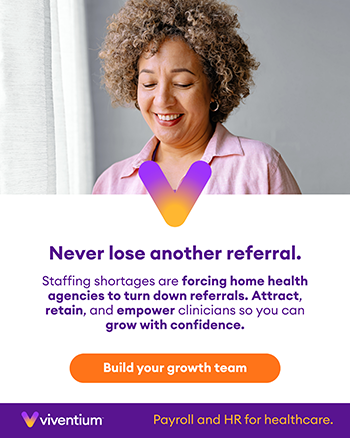HHAeXchange: An Interview with Paul Joiner
Caring for the Caregiverby Kristin Rowan, Editor
Paul Joiner Talks to The Rowan Report
The care at home industry changes seemingly daily with new regulations, HH agencies opening and closing, more people qualifying for Medicare, technological advances like artificial intelligence, and the list goes on. Since 2008, HHAeXchange has been part of the change and growth of the industry. This week, The Rowan Report sat down with CEO Paul Joiner to discuss HHAeXchange’s recent changes, upcoming changes, and acquisitions.
Cashé Software
On June 18, 2024, HHAeXchange announced the acquisition of Cashé Software, a Minnesota-based solution for homecare operations and billing. The merging of these two companies yields expanded ability to help homecare providers and billers with compliance, streamlined billing, and optimized workforce management.
Generations Homecare System
Just three weeks later, on July 8, 2024, HHAeXchange announced the acquisition of Generations Homecare System, an all-in-one homecare agency management software solution that connects care teams, simplifies daily tasks, and maintains compliance. This pairing aims to drive innovation and excellence in homecare.
Minnesota Office and Call Center
Ten days after the acquisition of Generations, HHAeXchange announced the opening of a new office and call center in Bloomington, MN. The office will offer localized, skilled agents to provide timely, efficient, and responsive customer support. This location will also be a home base for HHAeXchange employees who work remotely in the area and will provide job opportunities and growth in Bloomington.
Paul Joiner: On the Record
Paul Joiner became the CEO of HHAeXchange in March of 2023. Joiner came to HHAeXchange after serving as CEO in the substance abuse and mental health space. We sat down with Paul this week to talk about his position, the recent acquisitions, and future plans for HHAeXchange.
The Rowan Report:
HHAeXchange has gone through significant change and growth just in the last couple of months. Can you tell us about some of the plans you made for HHAeXchange?
Paul Joiner:
A lot of the growth was keyed up when I came on board. I just took it to the finish line. Implementing growth effectively required some changes. There is some pressure in this industry to evolve quickly.
RR:
What are some of the challenges you faced?
Joiner:
The current issues of recruiting, onboarding, retention, and training put a lot of pressure on technology solutions. And the pace of that change makes it harder for tech solutions to keep up.

Paul Joiner, CEO, HHAeXchange
XRR:
Did that drive the strategy behind your recent acquisitions?
Joiner:
Looking at strategy in the context of current challenges: finding people who understand the space and finding knowledge applied in technology is not easy to find or to develop organically. Then we find businesses like Cashé where we like the people, their position, their geography, and they have pieces that will help us build toward our vision of being the leader in Medicaid homecare and driving value and efficiency.
RR:
What does acquiring Cashé do for HHAeXchange?
Joiner:
Well…I can’t tell you, because it’s part of a strategy that comes with a bigger reveal. But I can tell you that acquiring Cashé is part of our technology lift. They have built a new technology with modern architecture. We will use that as a starting point to provide an additional offering in the marketplace. Cashé enables us to build faster, and innovate faster. While we continue to invest in HHAeXchange, Cashé gives us a head start on modern tech that can be added to our current offerings, or sold as a stand-alone solution.
RR:
And what about Generations?
Joiner:
Generations is a great business that has put business logic and rules into their technology. They also have a geographical presence where HHAeXchange does not.
RR:
How did this rapid growth of two acquisitions and a new call center impact HHAeXchange?
Joiner:
Taking on this much change created the need for improved communication across three organizations. That communication helped us provide a better narrative for Cashé and Generations employees who may have been a little nervous about the change.
RR:
You must have some really great teams in those three organizations to navigate these changes.
Joiner:
We have a great team. There are a lot of people we’ve brought on board in the last two years as we continue to grow along with the incredible team of people who have been at HHAeXchange much longer. We’re comfortable dealing with scale, size, and complexity, so the changes didn’t overwhelm us.
RR:
What does future growth look like for HHAeXchange?
Joiner:
We will probably continue to acquire companies. Maybe not multiple companies in a matter of weeks, but we will continue when the opportunity arises. The spirit behind our strategy is to focus on what our customers need. We are in a position in the market to have a big responsibility to be good stewards, help our customers, caregivers, and agencies, and improve the quality of life for patients.
HHAeXchange is focused on getting the right technology into the hands of caregivers. We’ve already done EVV and point-of-care well. Can we make a difference now in how they are onboarded and scheduled? Can we make a difference in billing and how they’re getting paid? That requires acquisitions and investing organically.
RR:
Any final remarks on what the future holds for HHAeXchange?
Joiner:
Part of our vision board is building a community of caregivers through technology. The good agencies are trying to figure out how to think as much about the caregiver as they do for the people receiving care. Turnover and training is so hard, so we need to invest in our caregivers.
We also need to be a better supplier of data to arm agencies and health plans with the data they need so they can have useful discussion around the date and how they’re supporting caregivers. I’m sad sometimes because agencies don’t get enough financial support for their effort. The industry can be doing more for their caregivers.
We take our responsibility to do the right thing seriously. Because of this, we are investing in the space and we want more options so we can be better for the industry. Our intention is to make a difference.
RR:
Thank you, Paul for talking with us today.
About HHAeXchange
Founded in 2008, HHAeXchange is the leading technology platform for homecare and self-direction program management. Developed specifically for Medicaid home and community-based services (HCBS), HHAeXchange connects state agencies, managed care organizations, providers, and caregivers through its intuitive web-based platform, enabling unparalleled communication, transparency, efficiency, and compliance. For more information, visit hhaexchange.com or follow the company on Twitter, LinkedIn and Facebook.
# # #


Kristin Rowan has been working at Healthcare at Home: The Rowan Report since 2008. She has a master’s degree in business administration and marketing and runs Girard Marketing Group, a multi-faceted boutique marketing firm specializing in event planning, sales, and marketing strategy. She has recently taken on the role of Editor of The Rowan Report and will add her voice to current Home Care topics as well as marketing tips for home care agencies. Connect with Kristin directly kristin@girardmarketinggroup.com or www.girardmarketinggroup.com
©2024 by The Rowan Report, Peoria, AZ. All rights reserved. This article originally appeared in Healthcare at Home: The Rowan Report. One copy may be printed for personal use: further reproduction by permission only. editor@therowanreport.com


 Compassus provides home-based services including home health, infusion therapy, palliative and hospice care. The company’s more than 6,000 team members serve more than 100,000 patients annually across more than 250 locations in 29 states. This is not the company’s first joint venture. In 2020, Compassus became managing partner of Ascension at Home, a joint venture between Ascension and Compassus.
Compassus provides home-based services including home health, infusion therapy, palliative and hospice care. The company’s more than 6,000 team members serve more than 100,000 patients annually across more than 250 locations in 29 states. This is not the company’s first joint venture. In 2020, Compassus became managing partner of Ascension at Home, a joint venture between Ascension and Compassus. , compassionate care is provided by more than 60,000 associates serving communities in Florida, Kentucky, Maryland, New York, Ohio, South Carolina and Virginia, as well as throughout Ireland.
, compassionate care is provided by more than 60,000 associates serving communities in Florida, Kentucky, Maryland, New York, Ohio, South Carolina and Virginia, as well as throughout Ireland.





